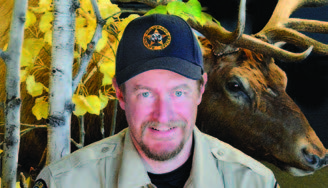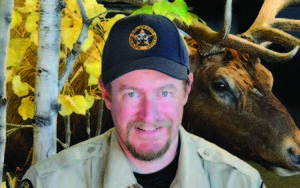
Aaron Berscheid is a district wildlife officer for Colorado Parks and Wildlife. Aaron covers the “wild” side of Northeast El Paso County, including Black Forest, Falcon, Peyton and Calhan. He also covers some of Elbert County, north of U.S. Highway 24 and south of State Highway 86, including the towns of Elbert, Kiowa, Ramah, Simla, Matheson and a small portion of the Limon area.
Furry, masked bandits having serious struggles
By Aaron Berscheid
District Wildlife Manager, CPW
As I was sitting down to think about what to write this month, I got a call from dispatch. I immediately knew the reason for the call: a sick raccoon.
How did I know? The furry masked bandits are having some serious struggles. Distemper is ravaging raccoon populations across the Pikes Peak region.
In fact, my fellow Colorado Parks and Wildlife officers and I have been responding to multiple calls a day of sick raccoons for several months.
Normally, CPW officers do not respond to raccoon calls. However, distemper is contagious and can cause severe health and safety issues for family pets that are not vaccinated and might come into contact with sick raccoons. So CPW is dispatching officers to reports of raccoons presenting signs of this terminal illness.
And while the outbreak has not quite reached the Black Forest area, I wouldn’t be surprised if it starts showing up. That’s why I am mentioning it to you.
Back to my call from dispatch. The Colorado State Patrol operator described a sick raccoon and its symptoms strongly suggested it was suffering from distemper. I urge everyone to pay attention to these signs in case you start seeing raccoons behaving oddly.
Your first clue will be spotting a raccoon during the day. They typically are nocturnal and shy, so if you see one wandering around in daylight, that is your first clue. However, being wild animals, they can be out during the day for a variety of reasons, so we look for more signs and symptoms.
Other symptoms include crusting around the eyes, seizures, muscle twitches, and partial or complete paralysis. It is animals displaying multiple symptoms that we are most concerned with.
This raccoon had been in the same place for most of the day. It appeared to be very disoriented, often walking in circles or lying down sleeping. When it would walk around, it had its face down toward the ground and was constantly drooling.
It would often only appear aware of its surroundings when there was a stimulus or noise that awoke it out of its stupor. Like most of these calls, the raccoon would not have a natural fear of humans. They don’t typically act aggressively like animals with rabies, but they don’t react properly with a fear of humans.
Outbreaks of distemper are common and happen every couple of years. Besides raccoons, distemper can also affect foxes, coyotes, skunks, and unfortunately, pets.
So, I have two cautions.
First, please vaccinate your pets. And make sure that they do not come in contact with any wildlife, especially with any animal presenting signs of distemper. Always walk your dogs on a leash, and be sure to check the yard before you let your pets out.
Second, and a common theme you will hear me say is, please don’t feed wildlife. They do not need human support to live. There are many negative impacts of feeding wildlife, but the spread of disease, like distemper, is a major impact.
Feeding wildlife causes them to congregate unnaturally. When animals get close to each other, like gathered nose-to-nose around a food source left by humans, they transmit disease at an alarming rate.
Those food sources can range from piles of birdseed placed intentionally by someone or an inadvertent source like an unsecured garbage can. Please keep your trash, pet food and barbecues cleaned up and secured so that no animals can get an easy meal.
This message is also a good reminder that bears will become active soon and this leads to a whole host of problems that can be avoided with bear and human interactions.
This distemper outbreak will run its course, and eventually the calls will slow down. Raccoon populations will rebound. But until then, let’s be smart and conscious of our impact on wildlife.
In the coming months, I’ll share more stories as I write about wildlife issues in our community. Got a question, problem or column idea? Please email me at aaron.berscheid@state.co.us or call me at 719-227-5231.
I might even answer your question in a future installment of “Wildlife Matters.”




